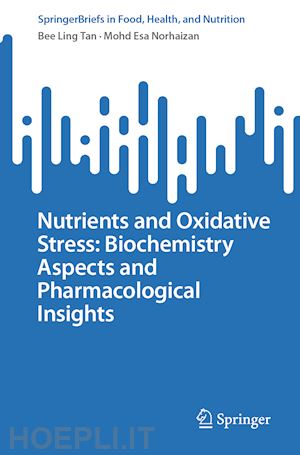
Questo prodotto usufruisce delle SPEDIZIONI GRATIS
selezionando l'opzione Corriere Veloce in fase di ordine.
Pagabile anche con Carta della cultura giovani e del merito, 18App Bonus Cultura e Carta del Docente
Oxidative stress plays a prominent role in the development of numerous human diseases associated with animal-based protein, high-carbohydrate diets and excessive fat consumption. Obesity represents the main risk factor for chronic diseases such as cardiovascular disease, cancer, and type 2 diabetes. Extensive research highlights the detrimental impacts of diets high in saturated fat and refined carbohydrates. Type 2 diabetes, cardiovascular disease and obesity are attributed to the sedentary lifestyles, overconsumption of foods high in saturated fats and carbohydrates, and the saturation of nutrient storage. Indeed, the effects of oxidative stress are associated with the absolute quantity and the type of macronutrients; both of these aspects contribute to oxidative stress and may favor the development of obesity-associated diseases and obesity. Nonetheless, the underlying mechanisms of nutritionally mediated oxidative stress are complex and poorly understood. The literature reported on nutritionally mediated oxidative stress and the role of diets in oxidative stress-induced diseases has not well been compiled in a singular source.
“Nutrients and Oxidative Stress: Biochemistry Aspects and Pharmacological Insights” explores how dietary choices dampen or exacerbate inflammation and oxidative stress. The implications of oxidative stress in glucose metabolism and adipocyte and obesity-associated non-communicable diseases are also discussed in this brief. Several issues linked to nutritionally mediated oxidative stress, including high carbohydrates, high animal-based proteins, and excessive consumption of fats and oxidative stress, and molecular mechanisms of oxidative stress-induced diseases are covered. The role of diets in oxidative stress-induced diseases is also discussed. By summarizing all the literature in one place, this work provides a cohesive representation of the information and practical reference on the underlying mechanisms of nutritionally mediated oxidative stress involved in the prevention of chronic diseases. The work provides a better understanding of the nutritionally mediated oxidative stress and the molecular mechanisms of oxidative stress in the development of chronic diseases and obesity.
1. Introduction and Background.- 2. Elements of Fundamentals of Oxidative Metabolism.- Biochemistry Aspects.- 3. Nutritionally Mediated Oxidative Stress.- 4. Molecular Mechanisms of Oxidative Stress-Induced Diseases.- 5. High Carbohydrates Intake and Type 2 Diabetes.- 6. High Animal-Based Proteins and Cancer.- 7. Excessive Consumption of Fats and Cardiovascular Disease.- Pharmacological Insights.- 8. The Role of Diets in Oxidative Stress-Induced Diseases.
Dr. Bee Ling Tan is a Senior Lecturer in the Department of Healthcare Professional, Faculty of Health and Life Sciences at the Management and Science University in Shah Alam, Selangor, Malaysia
Dr. Mohd Esa Norhaizan is a Professor in the Department of Nutrition, Faculty of Medicine and Health Sciences at the Universiti Putra Malaysia in Serdang, Selangor, Malaysia











Il sito utilizza cookie ed altri strumenti di tracciamento che raccolgono informazioni dal dispositivo dell’utente. Oltre ai cookie tecnici ed analitici aggregati, strettamente necessari per il funzionamento di questo sito web, previo consenso dell’utente possono essere installati cookie di profilazione e marketing e cookie dei social media. Cliccando su “Accetto tutti i cookie” saranno attivate tutte le categorie di cookie. Per accettare solo deterninate categorie di cookie, cliccare invece su “Impostazioni cookie”. Chiudendo il banner o continuando a navigare saranno installati solo cookie tecnici. Per maggiori dettagli, consultare la Cookie Policy.